Listen to this article: Signs of Raccoons
Raccoons are well adapted to living in Dallas-Fort Worth. They prefer to live close to a water and food source, two things that are easy to find near homes and businesses. While raccoons in your yard are more of a nuisance, when the critter gets inside your attic, chimney, or house, it becomes a big problem.
You will notice specific signs of raccoons on or near your property. When you see signs of a raccoon, contact a wildlife control expert to help safely remove them and minimize costly damages.
Raccoon Sounds
Listen to Raccoon Purring
Listen to Raccoon Movement Noises
Raccoons are active after dark, searching for food and water and socializing. Signs of a raccoon include hearing various noises in your attic, chimney, basement, crawlspace, ceilings, or walls. Examples include purring, chittering, growling, hissing, snarling, screeching, snorting, and screaming.
You may hear non-vocal raccoon sounds, too, like opening your outdoor trashcan and scattering the contents to find food. If you hear movement in your attic, ceilings, or walls, the raccoon is likely destroying drywall, shredding insulation, or clogging vents and pipes. You will also hear the scurrying or pitter-pattering of their feet when they run from one spot to another.
Strange Smells
Raccoons are filthy and have a foul odor. Their fur is greasy and filled with bacteria, germs, parasites, and other remnants from their travels.
If you notice a strange smell coming from your ceiling, walls, crawlspace, or basement, it could signal a raccoon is living with you. Many compare the scent of a raccoon to that of a musky smell, like a wet dog. Contributing factors of a raccoon’s smell include scent glands in its tail that activate during mating season and a combination of the natural oils and filth in their fur.
Raccoons have a unique habit of creating latrines, an area specifically for feces and urine. They use the same one repeatedly. Therefore, they make large waste piles in your attic, walls, or ceilings, and the odors will linger in your living space.
Raccoon Pawprints/Tracks
A raccoon’s paws have five long toes resembling tiny handprints. The back paws have five toes and a heel. You may find prints and tracks around garbage cans, swimming pools, on the lawn, around water sources, attic floors, and outside your home.
Raccoons have an unusual way of moving, making their tracks easy to identify. When they walk or run, their right hind paw lands next to their left front paw, and their left hind paw lands next to their right front paw. Raccoon tracks appear in two sets, each containing a front and hind paw.
Exterior Home Damage
Raccoons are excellent climbers and can climb on every part of your home’s exterior. Raccoon attempts to find entry points will create holes and gaps in your home.
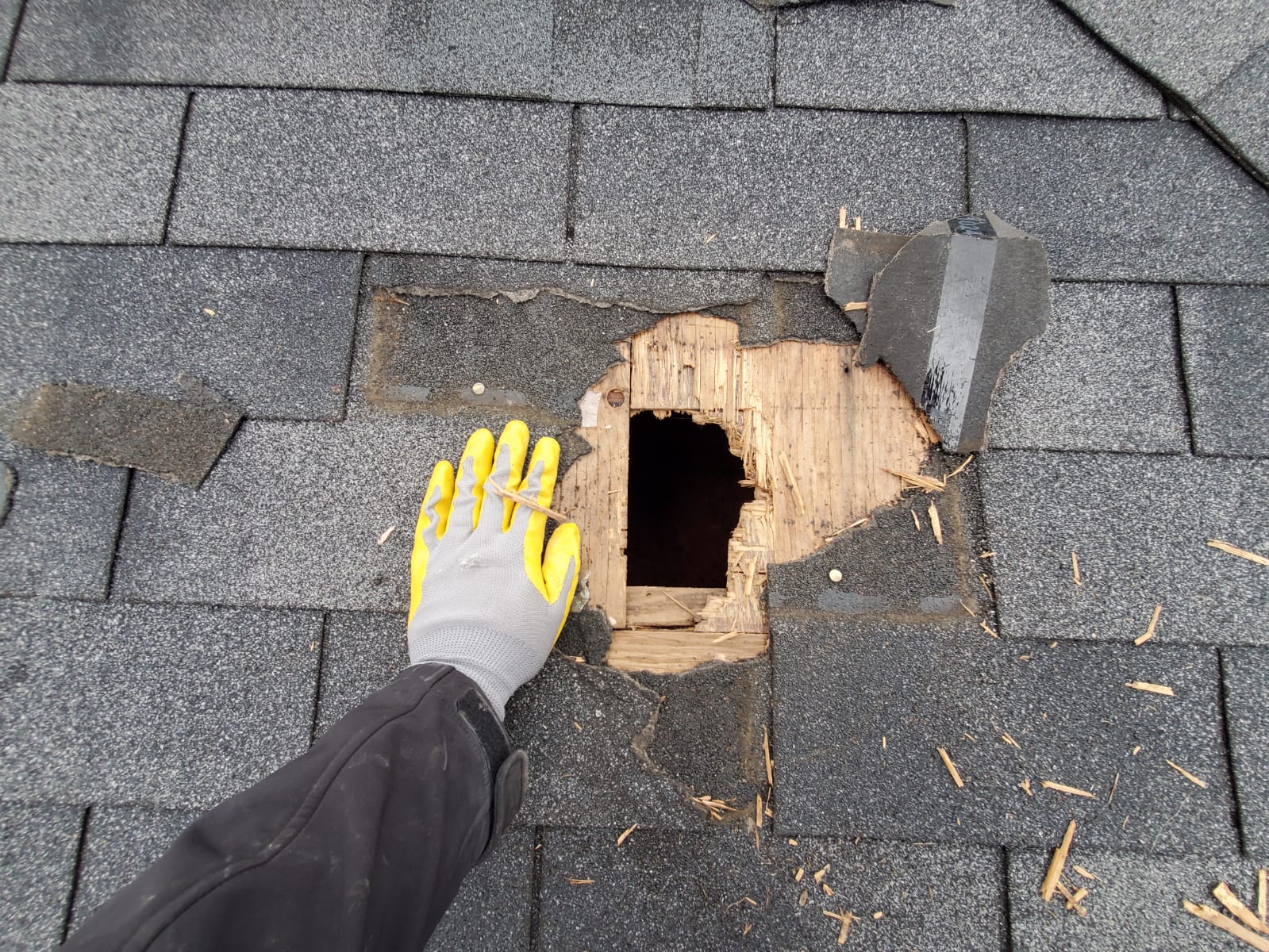
Typical raccoon damage includes:
- Cause shingles to slide
- Gnaw on electrical wires
- Break vent and chimney caps
- Make small cracks or holes bigger in attic vents and eaves
- Break and bend gutters and pipe joints
- Peel apart siding and soffits
- Leave smudge marks on the siding
- Tear insulation off pipes and ducts
Raccoons also damage your lawn by digging holes to search for insects, raiding bird feeders, scraping bark from trees, stealing garden crops, and devouring fruits from citrus and other trees.
Raccoon Damage Inside
Raccoon scratch marks typically appear as a series of shallow, parallel lines on surfaces such as wood, drywall, or insulation. These marks are often around 2-3 inches apart and can vary in length depending on the size and strength of the raccoon.
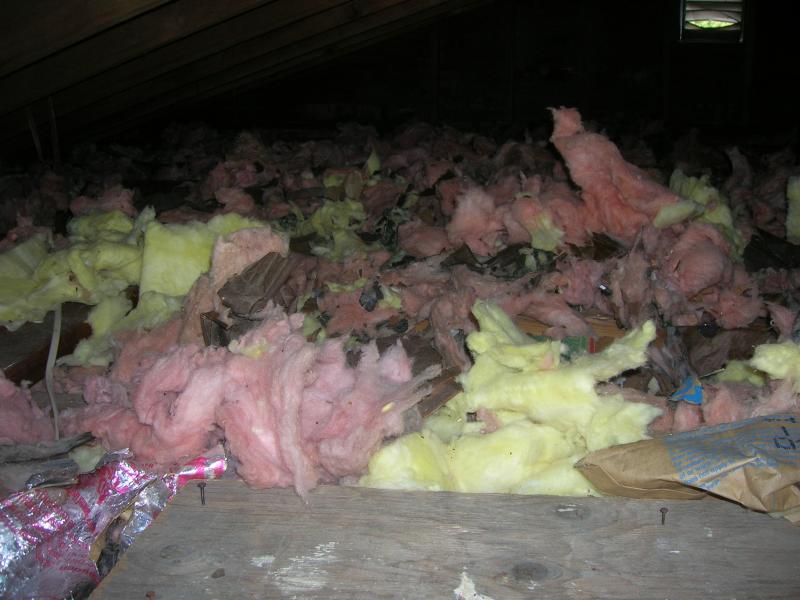
Raccoons will damage attic insulation. Raccoons will tear and shred insulation materials like fiberglass or cellulose to create nesting sites. Raccoons can trample and compact insulation as they move around in search of food or shelter. Compacted insulation loses its effectiveness in providing thermal resistance, leading to increased energy costs for heating and cooling. Raccoons may defecate and urinate in the attic, causing contamination of the insulation material. This not only damages the insulation but also creates foul odors and health hazards due to the presence of feces and urine.
Garbage Distribution
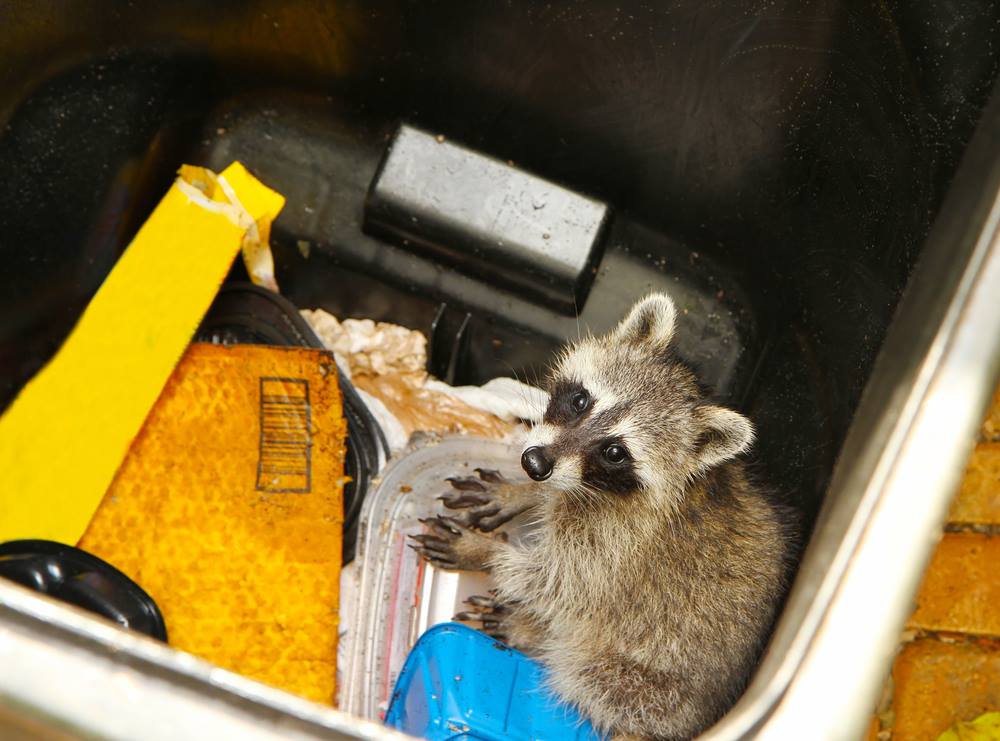
If you do not securely lock your garbage in a can, a raccoon will rummage through it. Raccoons can lift lids off trash bins, slide doors of dumpsters, undo bungee cords and even turn doorknobs to enter a storage room. Once they access your trash, they scatter it in your yard or along your street.
When other animals see a raccoon messing with your trash, they join in on the fun. Some raccoons climb into cans or dumpsters but can’t climb out, so be careful when checking a trash bin. You may encounter a scared raccoon. Dumpster diving for raccoons means they pick up many different types of bacteria. If you encounter a raccoon, do not try to handle it.
Nesting Materials
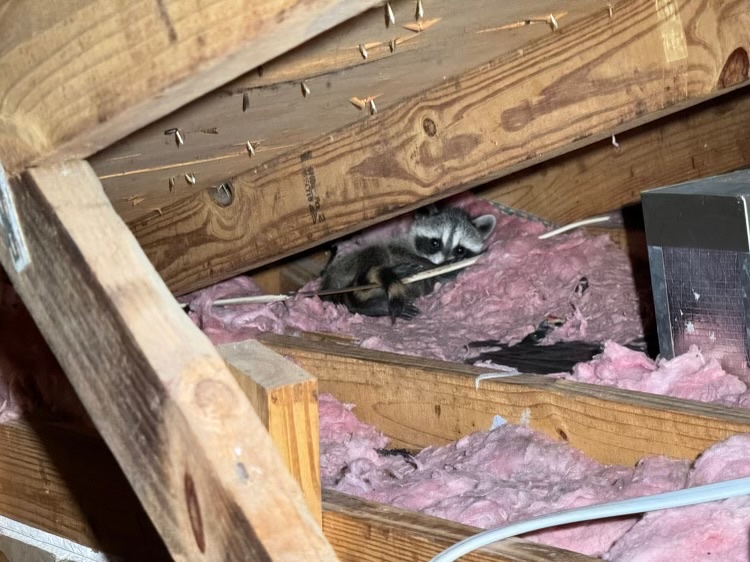
Raccoons build nests for two primary reasons: to stay warm and to give birth to pups. If they nest in your attic, expect them to use nesting materials they find nearby. For example, they will rip and tear insulation, drywall, wood shavings, and anything else lying around. They will open storage containers holding your sentimental items and steal them to build a nest. If they can’t find enough materials in your attic, they will drag in leaves, twigs, branches, garbage, and other items from outside.
Strange Smells
Raccoons are filthy and have a foul odor. Their fur is greasy and filled with bacteria, germs, parasites, and other remnants from their travels.
If you notice a strange smell coming from your ceiling, walls, crawlspace, or basement, it could signal a raccoon is living with you. Many compare the scent of a raccoon to that of a musky smell, like a wet dog. Contributing factors of a raccoon’s smell include scent glands in its tail that activate during mating season and a combination of the natural oils and filth in their fur.
If you smell strange odors in your attic, ceilings, or walls, this is a sign of a raccoon and is likely caused by feces and urine. Some describe it as smelling like dog poop, cat urine, rotten fruits, or ammonia.
Raccoons designate latrines, an area specifically for droppings and urine. They use the same one repeatedly. Therefore, they make large scat piles in your attic, walls, or ceilings, and the odors will linger in your living space.
It is imperative to avoid contact with raccoon feces and urine. While their feces is hard and can be picked up and removed, it harbors mold spores that can be dangerous for humans. It may also contain parasites, like roundworm and giardia, that can infect humans when inhaled or accidentally ingested. You risk acquiring bacterial infections, like leptospirosis. It leads to flu-like symptoms and digestive problems. Hantavirus, another disease, can lead to severe respiratory issues.
Seeing Raccoon Droppings
Raccoon feces looks a lot like dog poop. Common sites of raccoon feces and urine piles include dark corners in your attic, hidden spots on your roof, under trees, crawlspaces, and basements. Suppose a raccoon makes a latrine in a hard-to-reach area, like inside your ducts or insulation or between walls. Your and your family’s health is at higher risk for disease exposure. Odors and spores can travel through ductwork to every other area of your home.
Changes in Pet Behavior
Pets, especially dogs, will likely notice you have a raccoon problem before you do. Their enhanced sense of smell and sight alerts them to other creatures living in their space. Dogs will seem obsessed with the area in which they sense a raccoon. They may bark, whimper, growl, or snarl at the location where they sense raccoon activity. They may also pace back and forth or try to get your attention, persuading you to inspect the area.
Your and your family’s safety should be a priority, and so should your pet’s. A dog’s first instinct may be to aggressively approach a raccoon to protect its territory. However, raccoons carry diseases that can be transmitted to pets, putting them in grave danger. Raccoons engage in fights by scratching at the eyes of other animals. They then bite the chest and abdomen area.
If you have signs of a raccoon infestation, hiring a wildlife control expert ensures the safe, efficient, and effective raccoon removal.




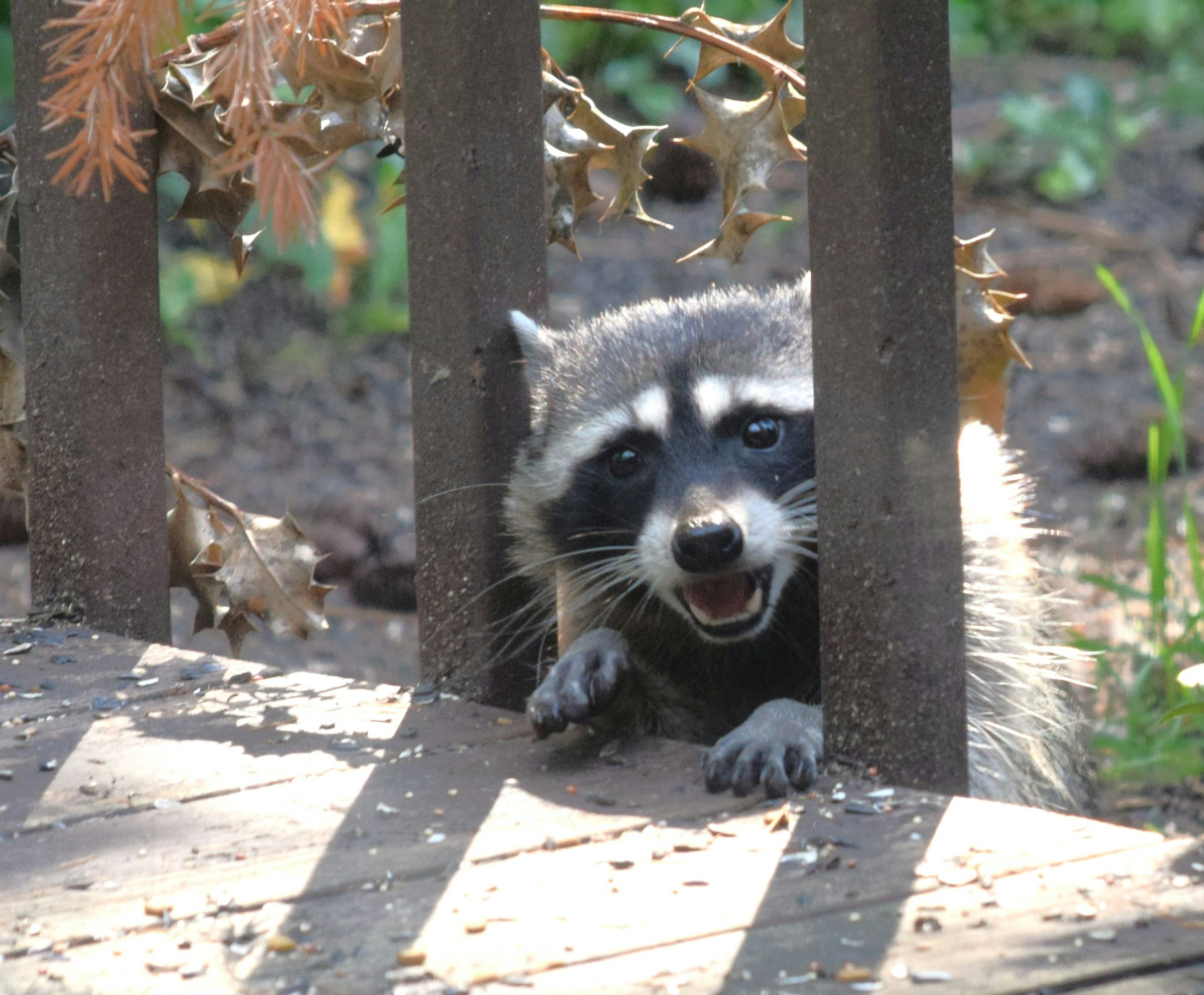
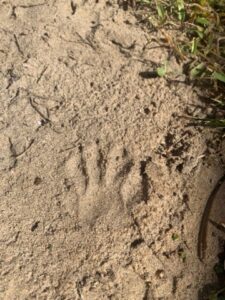
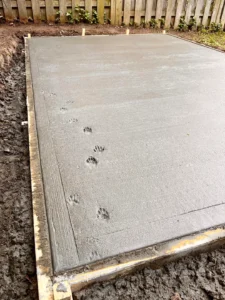
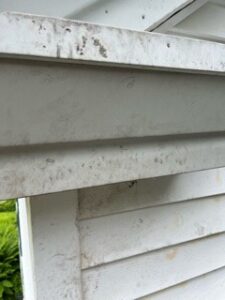
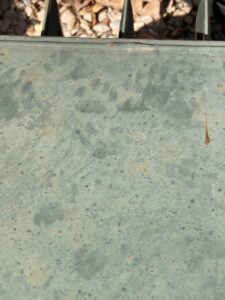
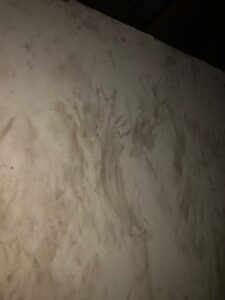
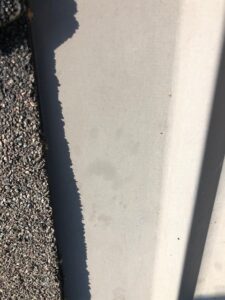
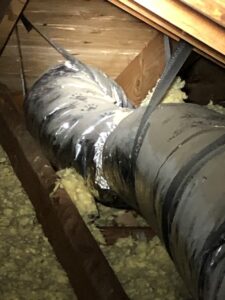
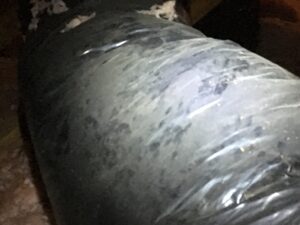
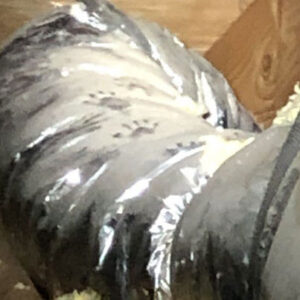
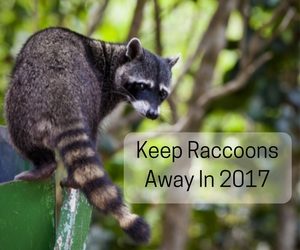 become dependent on rifling through our garbage cans for food, which brings them way too close to our homes and families. We always recommend calling on professional assistance when dealing with a raccoon problem, but there are things you can do to help keep the furry bandits at a safe distance. The following are some tips we recommend for getting rid of raccoons.
become dependent on rifling through our garbage cans for food, which brings them way too close to our homes and families. We always recommend calling on professional assistance when dealing with a raccoon problem, but there are things you can do to help keep the furry bandits at a safe distance. The following are some tips we recommend for getting rid of raccoons.